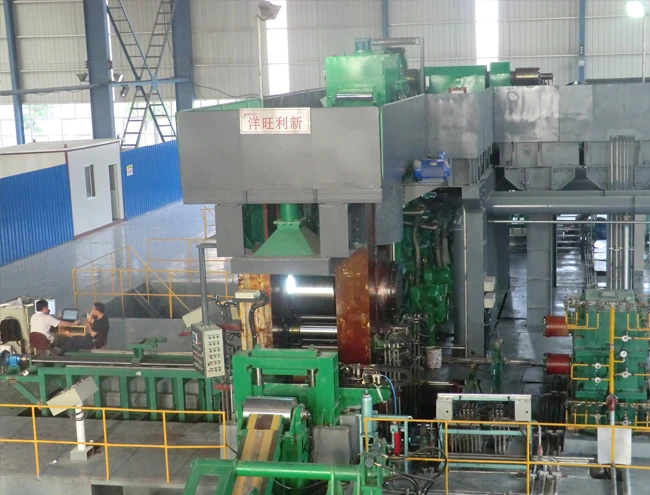
Cladding Rolling Mill: Advanced Metal Composite Solutions | Cold Rolling Cladding & Roll Bonding
Cladding Rolling Mill has emerged as a groundbreaking solution in the metal processing industry, offering a sustainable and efficient method for producing high-quality composite materials. Developed by Beijing Yang Wang Li Xin Sci&Tech Co.,Ltd. (formerly Shijiazhuang Yangwang Electromechanical Technology Co.,Ltd), this technology addresses long-standing challenges in traditional cladding processes. This article explores the technical features, advantages, applications, and company background of this innovative system.
Technical Features of Cladding Rolling Mill
The Cladding Rolling Mill utilizes a cold rolling process to produce metal composite strips with exceptional surface quality. Unlike conventional methods that require acid pickling, this technology eliminates surface oxides entirely, resulting in a clean, high-quality finish. The process also aligns with global energy conservation and environmental protection standards by eliminating the need for re-heating and post-rolling acid treatment.
One of the key innovations is its simplified production workflow, which includes three main stages: surface preparation, bonding rolling, and annealing. This streamlined approach ensures a yield rate exceeding 90%, significantly reducing production costs and capital investment. The system's versatility allows for the creation of bimetallic or tri-metallic composites in a single production line, catering to diverse industrial needs.

Key Advantages of the Technology
The Cladding Rolling Mill offers several distinct advantages over traditional methods like hot roll bonding cladding and explosive cladding:
- Superior Surface Quality: The cold rolling process prevents oxide formation, eliminating the need for acid pickling and reducing surface defects.
- Environmental Sustainability: Energy consumption is minimized by avoiding re-heating, and the absence of acid treatment reduces chemical waste.
- High Efficiency: With a yield rate above 90%, the system maximizes material utilization and lowers operational costs.
- Cost-Effective Production: Reduced investment and maintenance requirements make it an attractive option for manufacturers.
According to the National Institute of Standards and Technology (NIST), "Cold rolling processes can achieve higher precision and surface finish compared to hot rolling, making them ideal for applications requiring strict quality control" (NIST Source). This aligns with the Cladding Rolling Mill's ability to produce strips with a minimum thickness of 0.2mm and a maximum width of 1000mm.
Technical Specifications Table
| Parameter | Specification |
|---|---|
| Maximum Strip Width | 1000 mm |
| Minimum Thickness | 0.2 mm |
| Material Compatibility | Copper-Steel, Aluminum-Steel, Copper-Aluminum, Aluminum-Stainless Steel, Stainless Steel-Steel |
| Yield Rate | Over 90% |
| Energy Consumption | Reduced by 30-40% compared to traditional methods |
Applications in Diverse Industries
The Cladding Rolling Mill's flexibility makes it suitable for a wide range of applications:
- Electronics: High-conductivity copper-aluminum composites for heat sinks and connectors.
- Chemical Industry: Corrosion-resistant stainless steel-steel composites for reactors and pipelines.
- Automotive: Lightweight aluminum-steel composites for body panels and structural components.
- Construction: Decorative and durable cladding materials for facades and interiors.
For instance, the copper-steel cladding technology has been successfully implemented in actual production, meeting the demands of high-precision electronic components. Similarly, aluminum-steel cladding is widely used in automotive manufacturing for weight reduction without compromising strength.
Company Background: Beijing Yang Wang Li Xin Sci&Tech Co.,Ltd.
Beijing Yang Wang Li Xin Sci&Tech Co.,Ltd. is a leading innovator in metal composite technology, with a strong focus on R&D and sustainable manufacturing. The company has independently developed cold rolling cladding technology and complete equipment, integrating global advancements in the field. Their expertise spans multiple material combinations, including clad pipe welding and roll bonding cladding.
With a commitment to environmental responsibility, the company's solutions align with international standards for energy efficiency and pollution control. Their products have been adopted in electronics, chemical processing, and automotive sectors, demonstrating the technology's versatility and reliability.
Conclusion
The Cladding Rolling Mill represents a significant leap forward in metal composite production, combining technical innovation, environmental sustainability, and cost efficiency. By eliminating traditional drawbacks like acid pickling and high energy consumption, this technology sets a new benchmark for the industry. As global demand for eco-friendly manufacturing grows, Beijing Yang Wang Li Xin Sci&Tech Co.,Ltd. is well-positioned to lead the transition toward smarter, greener production methods.
For more information, visit the Cladding Rolling Mill Product Page or explore the company website.
References
National Institute of Standards and Technology (NIST) - Energy Efficiency in Metal Processing
-
YWLX’s 1450mm Six-Hi Reversing Mill Goes Live in BangladeshNewsNov.24,2025
-
Adjusting Roll Gap in 6Hi Reversing Cold Rolling Mill for Thin StripNewsNov.13,2025
-
Quality Control Standards for Automatic Gauge Control in Strip RollingNewsNov.13,2025
-
Effect of Skin Pass Rolling on Metal DuctilityNewsNov.13,2025
-
Key Components of a Modern TempermillNewsNov.13,2025
-
Common Wear Patterns of Work Roll in Tandem Cold Mill OperationsNewsNov.13,2025
-
Revolutionary Skin Pass Rolling Technology for Enhanced Steel QualityNewsNov.04,2025










